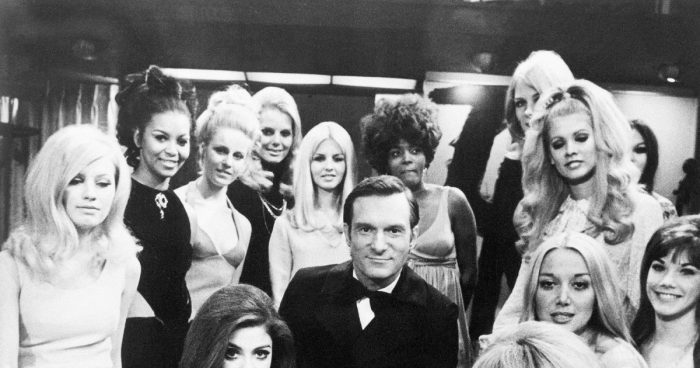
Dir: Brigitte Berman | Doc CANADA | With: Bruce Belland, Kitty Bruce, Whoopi Goldberg, Bill Maher, Ron Simon, Tony Bennett, Dick Gregory, Smokey Robinson, Leon Isaac Kennedy, John Burk, Annie Ross, Tim Hauser, Pete Seeger, Taj Mahal, Barry Melton, Dick Rosenzweig, Barbara Dane, Robert Clary, Roger McGuinn, Sivi Aberg, John Kay, Joan Baez, Michael Wadleigh, Gene Simmons, Jim Brown, Charles Strouse
Brigitte Berman chronicles the Playboy founder’s short but controversial foray into television in her entertaining and informative documentary.
Musical interludes and talking heads are deftly interwoven to provide an appreciation of just about everyone who was culturally significant throughout the Swinging Sixties. The initially engaging film increasingly works as a full-on history of US race relations, showing how black people were ostracised from the mainstream cultural offering music-wise.
This is not Berman’s first foray into the life of Hugh Hefner. In 2009 she made a documentary for Netflix: Hugh Hefner: Playboy, Activist and Rebel. The thrust of this latest film is his TV career which took the form of two TV shows set in his own bachelor pad where sexy women pander to eminent celebrities of both sexes providing the pithy cultural and political counterpoint to a relaxed soirée:”Playboy’s Penthouse” which began in Chicago in 1959 and was known as a ‘talk-and-music syndicated show’. So while David Frost was presenting That The Was the Week That Was in the UK, Hugh Hefner had found a cool way of inviting America into his drawing where an eclectic mix of black and white musicians (culturally unheard of back in the day, along with Jazz on TV) who performed in the relaxed and genial environment. These affairs include impromptu numbers from Sarah Vaughan, Nina Simone, Count Basie, Samie Davis Jr; Ray Charles and Toni Bennett.
On of the talking heads is Whoopi Goldberg who points out, Hefner “was a pioneer. There was nothing like it in television. And there was nothing like it because he made sure everybody was welcome.” But in the less liberal south stations refused to air this interracial mishmash and Hefner eventually pulled “Playboy’s Penthouse” in late 1960.
The other politically progressive show more focused on rock music and the counter-culture was “Playboy After Dark”, which launched in Hollywood in the summer of 1968 after Playboy’s operations moved to California. This saw Joan Baez;, Steppenwolf; The Byrds; Gore Vidal, Jerry Garcia. Peter, Paul and Mary, Smokey Robinson, and Woodstock director Michael Wadleigh – who looms rather too large. The mood is not as intimate in tune with the 1970s which felt a lot more serious generally and the chat focused on censorship, ecology and race. This time Hefner had graduated to ongoing partner in the shape of Barbi Benton and the summer-of-love vibe was echoed in “Born to Be Wild”. Another black talking head was football and film star Jim Brown who proudly claims “Hefner lets me say all the things I wanted to say,” namely that America’s black population should now focus on“expertise and finance.” Whatever that meant.
And as the bandwagon rolls on the focus is less on the music and fascinating celebrity chatter and more on general social commentary especially from Pete Seeger, beating his drum in the same old way as torpor gradually take hold of the final 20 minutes or so with the umpteenth rendition of “We Shall Overcome”.
It has to be said that this documentary certainly raises Hefner’s profile in a good way. He emerges culturally aware, racially tolerant, innovative and chipper who is articulate, voluable even, and professional and incisive in his interviewing technique. And for those who remembered the era this film certainly goes down a treat. MT
CANADA NOW | 24 -28 APRIL 2019